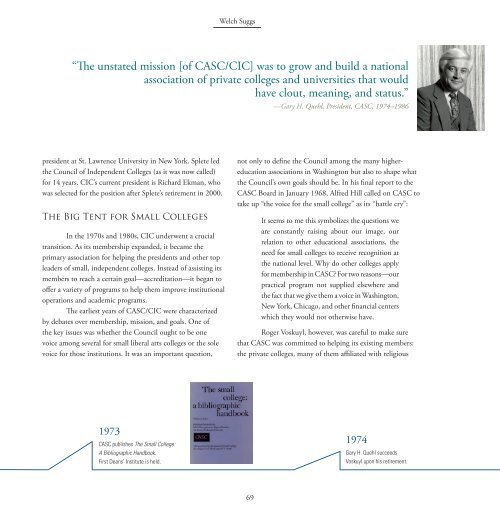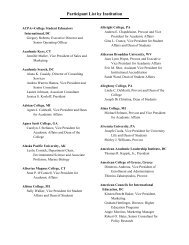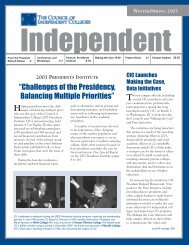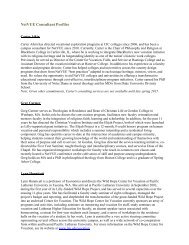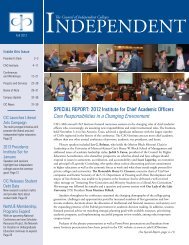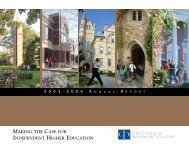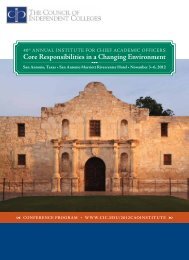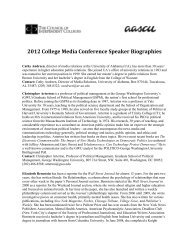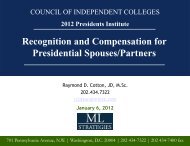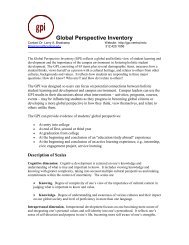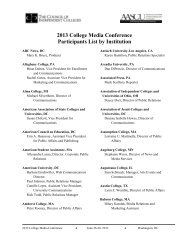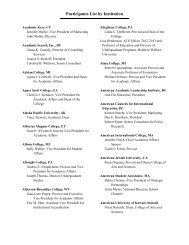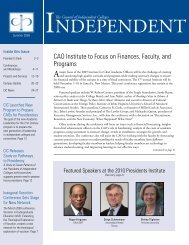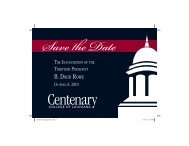Meeting the Challenge: - The Council of Independent Colleges
Meeting the Challenge: - The Council of Independent Colleges
Meeting the Challenge: - The Council of Independent Colleges
You also want an ePaper? Increase the reach of your titles
YUMPU automatically turns print PDFs into web optimized ePapers that Google loves.
Welch Suggs<br />
“<strong>The</strong> unstated mission [<strong>of</strong> CASC/CIC] was to grow and build a national<br />
association <strong>of</strong> private colleges and universities that would<br />
have clout, meaning, and status.”<br />
—Gary H. Quehl, President, CASC, 1974–1986<br />
president at St. Lawrence University in New York. Splete led<br />
<strong>the</strong> <strong>Council</strong> <strong>of</strong> <strong>Independent</strong> <strong>Colleges</strong> (as it was now called)<br />
for 14 years. CIC’s current president is Richard Ekman, who<br />
was selected for <strong>the</strong> position after Splete’s retirement in 2000.<br />
<strong>The</strong> Big Tent for Small <strong>Colleges</strong><br />
In <strong>the</strong> 1970s and 1980s, CIC underwent a crucial<br />
transition. As its membership expanded, it became <strong>the</strong><br />
primary association for helping <strong>the</strong> presidents and o<strong>the</strong>r top<br />
leaders <strong>of</strong> small, independent colleges. Instead <strong>of</strong> assisting its<br />
members to reach a certain goal—accreditation—it began to<br />
<strong>of</strong>fer a variety <strong>of</strong> programs to help <strong>the</strong>m improve institutional<br />
operations and academic programs.<br />
<strong>The</strong> earliest years <strong>of</strong> CASC/CIC were characterized<br />
by debates over membership, mission, and goals. One <strong>of</strong><br />
<strong>the</strong> key issues was whe<strong>the</strong>r <strong>the</strong> <strong>Council</strong> ought to be one<br />
voice among several for small liberal arts colleges or <strong>the</strong> sole<br />
voice for those institutions. It was an important question,<br />
not only to define <strong>the</strong> <strong>Council</strong> among <strong>the</strong> many highereducation<br />
associations in Washington but also to shape what<br />
<strong>the</strong> <strong>Council</strong>’s own goals should be. In his final report to <strong>the</strong><br />
CASC Board in January 1968, Alfred Hill called on CASC to<br />
take up “<strong>the</strong> voice for <strong>the</strong> small college” as its “battle cry”:<br />
It seems to me this symbolizes <strong>the</strong> questions we<br />
are constantly raising about our image, our<br />
relation to o<strong>the</strong>r educational associations, <strong>the</strong><br />
need for small colleges to receive recognition at<br />
<strong>the</strong> national level. Why do o<strong>the</strong>r colleges apply<br />
for membership in CASC For two reasons—our<br />
practical program not supplied elsewhere and<br />
<strong>the</strong> fact that we give <strong>the</strong>m a voice in Washington,<br />
New York, Chicago, and o<strong>the</strong>r financial centers<br />
which <strong>the</strong>y would not o<strong>the</strong>rwise have.<br />
Roger Voskuyl, however, was careful to make sure<br />
that CASC was committed to helping its existing members:<br />
<strong>the</strong> private colleges, many <strong>of</strong> <strong>the</strong>m affiliated with religious<br />
1973<br />
CASC publishes <strong>The</strong> Small College:<br />
A Bibliographic Handbook.<br />
First Deans’ Institute is held.<br />
1974<br />
Gary H. Quehl succeeds<br />
Voskuyl upon his retirement.<br />
69


